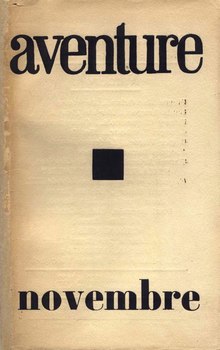Roger Vitrac
Roger Vitrac (French: [vitʁak]; 17 November 1899 – 22 January 1952) was a French surrealist playwright and poet.
Roger Vitrac | |
|---|---|
 Vitrac (centre) with Bureau confédéral des SPF (1938) | |
| Born | 17 November 1899 |
| Died | 22 January 1952 Paris, France |
| Occupation | Writer |
Early life
Roger Vitrac was born in
Career
In 1919 he published his first collection of poems, Le Faune noir.[3] In 1920 he began his obligatory three-year military service.[1]:527 While serving, he was introduced to Dadaist performances in Paris and became interested in the movement. He even 'took to distributing Dada manifestos in the barracks'.[4]:358 He also 'presented a play in Dadaistic character' entitled La Fenêtre Vorace, which has since been lost.[4]:358 It was during this time that he met Marcel Arland, François Baron, Georges Limbour and René Crevel, and founded the literary revue, Aventure.[1]:527

In 1921, Vitrac met André Breton and Louis Aragon at the Café Certa, which was one of the headquarters for Dada, and later Surrealist, activities.[citation needed] That same year, he attended the Dadaist Excursion to the Church of Saint-Julien-le-Pauvre and become formally associated with the Dadaists.[4] He would continue to develop this network as a founding member of the Surrealist movement and one of the signatories of Breton's First Surrealist Manifesto (1924).[5] He was expelled from the movement in 1925 for his pursuit of the theatre, among other infractions.[1]:527
Theater Alfred Jarry
In 1926, Vitrac founded the Théatre Alfred-Jarry with Robert Aron and Antonin Artaud (who was also expelled from the Surrealist movement).[6] It was here that Vitrac premiered his plays, Les Mystères de l'amour [The Mysteries of Love] (1927), as well as his best known work Victor ou les enfants au pouvoir [Victor, or Power to the Children](1928).[6]
Later works
Vitrac joined Georges Bataille as one of the signatories of Un Cadavre against Breton and contributed to Documents with articles on "Gaston-Louis Roux" (1929, issue 7), "The Abduction of the Sabines" (1930, issue 6) and a poem, "Humorage to Picasso" (1930, issue 3), dedicated to the artist.[citation needed] From 1931, he worked as a journalist while further exploring burlesque style playwriting, which often operated between boulevard comedy and intimate tragedy.[citation needed] His multi-thematic Coup de Trafalgar (1934) and Les Demoiselles du large (1938) gained as little recognition as his more slapstick plays such as Le Loup-Garou (1939) and Le Sabre de mon père (1951).[citation needed]
In January 1937, Vitrac become Secretary General of the newly established Confédération des Syndicats Professionels Française (CSPF), a workers' union that claimed to be 'purely professional' and 'free of any political affiliation.'[7]:212-213
Death
Vitrac died in Paris on 22 January 1952.[1]:527
Legacy
Only after his death did Vitrac reach popular stardom with Jean Anouilh's 1962 production of Victor, or Power to the Children.[citation needed] Though it was written after Vitrac was expelled from Surrealist movement, Victor is often viewed as the key masterpiece of surrealist theatre,[8][9]:94
References
- ^ ISBN 978-0-8108-7945-4.
- ISBN 978-0-415-05999-2.
- ISBN 978-90-272-1732-5.
- ^ JSTOR 3206891.
- )
- ^ S2CID 194096618.
- ISBN 978-0-7735-6024-6.
- JSTOR 3735118.
- ISBN 978-1-317-10309-7.
